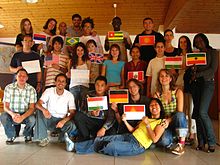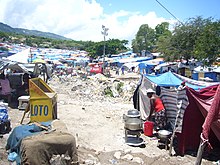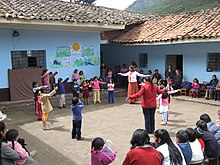Friends of Rudolf Steiner's art of education
| Friends of Waldorf Education Rudolf Steiner's
|
|
|---|---|
| legal form | registered association |
| founding | 1971 |
| Seat | Stuttgart , Germany |
| management | Nana Göbel , Bernd Ruf , Henning Kullak-Ublick , Andreas Schubert |
| Website | www.freunde-waldorf.de |
Friends of Waldorf Education (Friends of Waldorf Education or "Friends" for short) is a non-profit association founded in Stuttgart in 1971. The association promotes initiatives of a free education system and institutions that work on the basis of Waldorf education worldwide . As a supporting organization for voluntary services , the association places around 1700 volunteers in Germany and abroad every year. The Emergency Pedagogy Department of the Friends of Waldorf Education has been providing international war and disaster aid for traumatized children and young people since 2006.
history
In 1919 Rudolf Steiner founded Waldorf education and founded the first Waldorf school in Stuttgart. In 1971 , Ernst Weissert founded the Friends of Waldorf Education in order to be able to support and finance Waldorf education and a free school system worldwide . On the first board were his friend Manfred Leist, Günter Ziegenbein (board member of the Free Waldorf School at the Kräherwald) and Armin Scholter (managing director of this school). Many former students of the Stuttgart-Uhlandshöhe Waldorf School became members. However, Ernst Weissert and Manfred Leist each had other demanding tasks in building up the German school movement and in leading the Federation of Free Waldorf Schools , so that there was not much time for this association.
In 1976, former Waldorf students took up the idea of founding a world school association. Ernst Weissert supported this intention and offered them the Friends of Waldorf Education Association as a legal instrument. Andreas Büttner, Nana Göbel and Justus Wittich were elected to the board in November 1978, Günther Ziegenbein and Armin Scholter left. They renamed the association Friends of Waldorf Education. In 1987 Bernd Ruf was elected to the board. Nana Göbel and Bernd Ruf, she in Berlin, he in Karlsruhe, lead the association as the two managing directors. Since 1976 the association has been building international funding and networking for Waldorf educational institutions, among other things with the help of the newly established International Aid Fund. In 1994, the Friends of Waldorf Education were invited by UNESCO to the International Conference on Education in Geneva to present Waldorf education to an international audience. The cooperation with UNESCO continued and in May 2001 the Friends of Waldorf Education were accepted as a foundation with official relations with UNESCO. Today the association employs over 100 people with two branches in Berlin and Karlsruhe (as of August 2018). The board of the association consists of Nana Göbel , Bernd Ruf , Henning Kullak-Ublick and Andreas Schubert.
Focus of work
The work of the Friends of Waldorf Education is divided into different areas of work, which, however, are all related to and in the service of Waldorf education.
Project funding / international aid fund
The Friends of Waldorf Education support Waldorf schools, Waldorf kindergartens and anthroposophical curative educational institutions worldwide with donations, but also with advice, networking, mentors, etc. The association does not have its own capital, so it is not a foundation, but receives donations and grants from many individual donors, Waldorf schools, other institutions and foundations working with him, which he uses for the benefit of the donor. It is important to the friends of Waldorf Education that donors decide for themselves who or what they want to fund. You see yourself as a service provider for international Waldorf education. Around 95% of all donations received by the Friends of Waldorf Education are for a specific purpose. Donors support institutions with which they have a personal relationship or that they would like to help based on a report or other reason. The Friends of Waldorf Education work with foundations, other aid organizations and the BMZ to enable the necessary larger investments .
Voluntary service
The Friends of Waldorf Education have been sponsors of international voluntary services since 1993. All volunteers work in Waldorf educational and anthroposophically oriented institutions: schools, kindergartens, social work projects, curative educational institutions, communities with people with increased needs and in biodynamic agriculture. A social year abroad with friends as sponsors can be done through the following state-funded programs:
- International Youth Voluntary Service (IJFD)
- Development volunteer service weltwärts
- Other service abroad (ADiA)
- European Voluntary Service (EVS) - European Solidarity Corps ( ESC, ESK, EFD, EVS)
For international voluntary service, the “friends” are certified with the Quifd seal of approval (quality in voluntary service). The association has also been offering voluntary services in Germany since 2011:
- Federal Voluntary Service (BFD)
- Voluntary Social Year (FSJ)
As one of the few sponsoring organizations, the Friends of Waldorf Education have also been giving international volunteers a social year in Germany since 2006. The program, which enables volunteers from abroad to do voluntary service in Germany, has been part of the Federal Voluntary Service since 2011. 200 incomers from over 40 countries are currently working in locations in Germany.
Educational sponsorships
At the end of the 1990s, the field of educational sponsorship was included in the work in order to enable individual children to attend a Waldorf school through sponsorships even in countries where Waldorf schools do not receive any state subsidies and therefore have to charge school fees. Sponsorships are a very individual form of help. From the beginning, the Waldorf School was and is intended to be a school open to all people and classes. Whether children can attend a Waldorf school should not depend on the economic circumstances of their parents. Here sponsorships are not only of great help for the individual child, but also for the whole school. Around 700 sponsorships were currently mediated directly by the association. These support the school attendance of a corresponding number of children in over 50 schools with around 25–200 euros per month.
WOW day
Since 1994, schoolchildren have been involved in Waldorf initiatives around the world for a day once a year. Through artistic activities or one-day jobs, they collect money for Waldorf institutions that urgently need help. With the help of the Friends of Waldorf Education and their cooperation partners, the Bund der Freie Waldorfschulen and the European Council for Steiner Waldorf Education, the student campaign is growing steadily. The pupils not only learn to be interested in a foreign cultural world and to get involved with others, but also experience what it is like to organize oneself collectively and to put one's own ideas into practice. In the first few years around 20 schools took part in WOW-Day, later it was around twice as many every year. Since 2009 the WOW-Day became a Europe-wide campaign and has been taking place worldwide since 2011. Over 200 Waldorf schools from more than 30 countries now take part in WOW-Day, which takes place on a set day in autumn. In total, schoolchildren have collected around 2.5 million euros at WOW-Day since 1994 (as of 2013). WOW-Day helps schools, kindergartens, curative educational institutions and social projects receive vital support: children in Kenya can go to school, in Brazil they experience alternatives to crime in the favelas and people with disabilities in Georgia have a dignified life enables. Over 100 institutions have already been funded by WOW-Day. The collected donations go to the Friends of Waldorf Education and are 100% forwarded to the projects by them.
Emergency pedagogy
Emergency pedagogy is dedicated to the psychosocial stabilization of children and young people in war and disaster areas. In 2006, special education teacher Bernd Ruf developed a comprehensive concept for emergency education based on Waldorf education after he was confronted with psycho-traumatized children in a refugee camp in Beirut in the context of the 2006 Lebanon war. Since then, the increase in armed conflicts and natural disasters has required acute operations with psychotraumatized children and adolescents in Lebanon (2006, 2013), China (2008, 2013), Gaza (2009-2013), Indonesia (2009), Haiti (2010-2016), Kyrgyzstan (2010), Japan (2011), Kenya (2012-2013,2017), Bosnia and Herzegovina (2014), Nepal (2015), Greece (2015), Slovenia (2015), Paris (2015), Brussels (2016), Ecuador (2016), Mexico (2017) and Bangladesh (2017-2018). In addition to acute missions, long-term projects and disaster risk management are other areas of responsibility. The aim here is to be able to react quickly in disaster situations by training regional teams on site.
The Friends of Waldorf Education are members of the Aktion Deutschland Hilft (ADH) aid alliance and work in cooperation with various other aid organizations of the alliance, such as B. 2012 with the organization Habitat for Humanity in Chile. In a study by UNICEF, the Songot kindergarten of the “Friends” in the Kakuma refugee camp in Kenya was ranked first out of all 12 existing kindergartens in the refugee camp. The Globus Foundation and the Deutsche Bank Foundation are sponsors of emergency pedagogy.
literature
- Bernd Ruf : Debris and trauma: anthroposophical basics of emergency pedagogical missions. Ita Wegmann Institute, 2012, ISBN 978-3-905919-39-4 .
- Friends of Waldorf Education, Rudolf Steiners eV (ed.): Waldorf education worldwide. Berlin 2011, https://www.freunde-waldorf.de/die-freunde/publikationen/waldorfpaedagogik-weltweit.html (accessed on: February 12, 2014 1:15 p.m.).
- Friends of Waldorf Education (Ed.): Waldorf Pedagogy - Exhibition catalog on the occasion of the 44th session of the International Conference on Education of UNESCO in Geneva. Stuttgart 1994, https://www.freunde-waldorf.de/die-freunde/publikationen/katalog-waldorfpaedagogik.html (accessed on: February 12, 2014 1:25 p.m.).
- Henning Kullak-Ublick: Every child is an expert - questions & answers about Waldorf education. Free Spiritual Life Publishing House , Stuttgart 2014, ISBN 978-3-7725-2725-8 .
- Nana Göbel: The Waldorf School and its people. Worldwide. Three volumes in a slipcase. Free Spiritual Life Publishing House, Stuttgart 2019, ISBN 978-3-7725-7919-6
- Volume 1, Waldorf Education: Its Development and Spread until the End of World War II
- Volume 2, Waldorf Education in Europe
- Volume 3, Waldorf Education in America, Australia, Africa and Asia. 1945 to 2019
- Friends of Waldorf Education (ed.): Insights worldwide - 100 years of Waldorf education. 100 Years of Steiner Education. In cooperation with Leica Camera AG / Kaufmann family, Kehrer Verlag , Heidelberg 2019, ISBN 978-3-86828-920-6
- Nana Göbel and Christina Reinthal (eds.): 100 years of education for freedom. Waldorf Education in the Countries of the World. Free Spiritual Life Publishing House, Stuttgart 2019, ISBN 978-3-7725-2919-1
Web links
Individual evidence
- ↑ Our employees. In: www.freunde-waldorf.de . Friends of Waldorf Education, accessed on November 2, 2018 .
- ↑ Friends of Waldorf Education (Ed.): Waldorf Education Worldwide. Berlin 2001, pp. 12-17.
- ↑ Newsletter Friends of Waldorf Education, Fall 2013 , p 12, on freunde-waldorf.de
- ↑ Newsletter Friends of Waldorf Education, Fall 2013 , on freunde-waldorf.de
- ↑ a b First Aid for the Soul - Emergency Pedagogy in War and Disaster Areas ( Memento of February 3, 2014 in the Internet Archive ), in November 2012 events and reports from institutions on an anthroposophical basis in the Hamburg area, pp. 5-19, on trust agency -hh.de
- ↑ aktion-deutschland-hilft.de
- ↑ Help for the weakest Deutsche Bank Foundation supports trauma project in Kenya ( Memento from July 14, 2014 in the Internet Archive ) on deutsche-bank-stiftung.de



